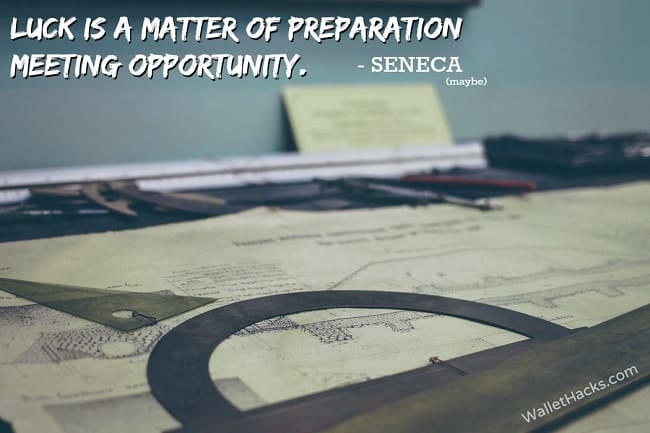In 1984, an ice cream truck driver appeared on the show Press Your Luck and proceeded to win $110,237 in cash and prizes.
For those too young to remember the show, contestants answered questions to win “spins.” For a spin, lights would flash around a board and the contestant would hit a button to stop it. Land on a prize, you can stop or keep going for more. Land on a “whammy,” a red little monster, and you’d lose everything that spin. Hence, press your luck.

This ice cream truck driver kept winning. And winning. And winning. To the disbelief of, basically, everyone who was watching, including the host.
As you can imagine, winning $110,237 in 1984 was a big deal. That’s nearly a quarter million dollars today.
Was America seeing the luckiest man in the world?
No, Michael Larson figured out there were only five patterns of flashing lights. He would study them, with his VCR, and when he got on the show… his good luck was actually good preparation.
Roman statesman Seneca the Younger once said, “Luck is the matter of preparation meeting opportunity.”
How many times in your life have you seen an opportunity and realized you were not in a position to take advantage?
It’s tough. While we don’t feel missed gains as painfully as we feel losses (known as loss aversion, first studied by Amos Tversky and Daniel Kahneman), it still hurts.
But there’s a way you can prepare yourself to take advantage of your good fortune.
We all know about saving for an emergency fund. (and alternatives to an emergency fund if you’re still funding it)
(and we all know about the next biggest saving goal – retirement)
What if your finances are strong and you’ve taken care of those… what next?
If we save for inevitable but unpredictable bad events, can we also save for inevitable but unpredictable good events?
Yes, I call it an opportunity fund.
An opportunity fund is a slug of money you’ve set aside to put towards … well, opportunities.
Table of Contents
Why You Need an Opportunity Fund
There are different kinds of opportunities:
- A business or real estate investment, where you expect a return,
- A loan or similar debt instrument, where you expect a return,
- A loan to a friend or family member, where you don’t expect a return,
- A great deal on something you already had your eye on,
- A donation to a worthy cause,
- The list is endless…
I separate them into three major categories – investments, purchases, and donations.
Investments
As you get older, you’ll see a lot more investment opportunities come your way. As your personal and professional network expands, you’ll talk to more people who might be starting a business or getting involved with an investment.
If you are tempted by an investment, you want to have money set aside to take advantage of it. You don’t want to dip into your retirement nest egg or risk your emergency fund. You want money set aside specifically for risky investments.
If it’s a private investment, where do these opportunities fit in your overall portfolio? I put them in the riskiest asset class. I don’t let it be more than 5% of all of my investments (it’s really less than 2%). They are illiquid, impossible to value, and really really risky – not my ideal investment mix. 🙂
They aren’t always private or risky. What if a stock you’ve had your eye on suddenly dropped 10% but still had strong fundamentals? A lot of blue chip stocks fell in the Great Recession and you could get stocks like GE in the spring of 2009 at just $7 a share and a 3.3% yield (GE now trades in the mid-20s). If you wanted to build a dividend portfolio, that was a great opportunity.

Unexpected Purchases
Right before my lovely wife started her doctorate, we treated ourselves to a vacation to Europe. One of our first stops was to visit our college friends living in England. They would join us as we went to Ireland and they’d catch a U2 concert in Croke Park.
Originally, we weren’t going to the concert. We were going to a nearby pub because we like U2 but not enough to want to spend a few hundred dollars to see them.
That was, until, two of our friends had a mix-up on their RyanAir flight and didn’t make it to Ireland in time to attend.
It was awful because of the six of us, they were the biggest U2 fans. They were the ones who were on the email list to get early tickets in the first place.
Through almost no fault of their own, they never made it onto their flight and the next one would cost them thousands of dollars. So they couldn’t make the show. 🙁
We offered to buy their tickets and we felt (financially) comfortable doing it because of the opportunity fund. We didn’t budget for it in our trip’s budget but we wanted to help our friends out by taking this one small thing off their mind, we knew we would have a great time, and we had the cash available to do it.
U2 is incredible in person too. Highly recommended even to a casual fan. (here are a series of videos from that show)
Another example of an unexpected purchase is a sale on an item you’re planning on buying. In my Upgrade & Save Strategy article, I talk about how you can make investments into what you buy to increase enjoyment, lifespan, and other features. If you have a list of items you plan on upgrading, one may come on sale before you planned on buying it. An opportunity fund makes it possible for you to take advantage right now, rather than waiting and missing out on the sale.
Donations
The opportunity fund can also be used for anything that is important to you. It’s not necessarily an investment where you need a return or a great deal on something you needed.
If you have a friend or family member in a jam and they need money, you can help. You don’t want to put yourself in a difficult position to help someone out, so having an opportunity fund is key for this.
How to Build Your Opportunity Fund
Much like an emergency fund, you need to figure out an amount and where you’ll store it.
In picking the amount, I like to keep it at half the size of my typical investment size. If your typical investment is $1,000 — then keep a $500 opportunity fund. I find that the biggest opportunities are financial, so I let that be the tent pole.
As for where I keep it, I keep mine in a high yield fund. In this case, that’s the Vanguard High-Yield Tax-Exempt Fund (VWAHX) where it yields 2.81% and pays an expense ratio of 0.20%. I like it because it keeps the amount relatively stable, I get a dividend, and the fee is low. There’s an Admiral Shares version that has an expense ratio of 0.12% (the minimum there is $10,000).
It’s as simple as that!
If you’ve managed to contribute as much as you care to into an emergency fund and your other savings goals, consider building an opportunity fund.
Do you have an opportunity fund? What are you thinking about using it on?




I love this idea of an opportunity fund. I spend a lot of money reinvesting in my business and the pay offs have been huge. I’m so grateful to have those funds available now.
One of the big mental shifts I had with respect to business was treating it like it’s own separate entity. When I was working on it early on, I would treat business income as my own from a psychological perspective. It was still segregated, for legal purposes, but I treated that income as mine and so spending it was much harder. As I matured a little, I saw that income as something I should invest back into the business to make it grow even faster. So in a sense, all of my business funds were opportunity based.
Jim, I’ve recently had the same shift. The money I would make from my business I saw it as my own personal money, but now I’m keeping them separate and reinvesting it back into my business.
I always hear alot about emergency funds, not too much about opportunity fund, but it makes so much sense.
That shift was huge for me because as a naturally frugal person, it’s easy to say “Oh I can do that myself.” The reality is that you could do almost anything yourself but if you focus on executing the process, that’s less energy you’ll spend on improving the process or growing the business. Growth is where the money is.
Jim, I agree that saving a chunk of change into an opportunity fund for unexpected opportunities is huge! You never know when you’ll come across deals and being prepared puts you in prime position to react quickly and capitalize.
In my case, I like deploying my opportunity fund into real estate related deals. (Great idea to store it in VWAHX while idle.)
Also, very nice of you to help out your friends and buy their U2 tix… great win-win!
Real estate often offers up a lot of great opportunities that come without any rhyme or reason. I’m just not personally all that interested in real estate myself, it just seems like a lot of effort. More effort than I’m willing to make I think. 🙂
I love this idea! Nearly everyone has gotten on board with the idea of an emergency fund, but now I think we need to share the idea of the opportunity fund. Great post!
Thanks Cat! 🙂
I think we have two camps, one where folks have saved up an emergency fund and need to know… what’s next?
And one who really needs to save up their emergency fund in the first place. I figure we have a lot of writing about this group, and it’s great, but not enough help for those who are in the first camp. 🙂
This x1000! Our emergency fund has turned into an opportunity fund at times, but having a separate fund is critical so as not to interrupt your normal cash flow. We just emptied our for an impromptu full kitchen remodel (weird, I know), but we got a free $2,500 fridge, and had to jump at the opportunity.
Now rebuilding toward my sports car obsession. A 1990 Nissan Skyline GTR (R32) is now legally importable….and will only go up in value……sounds like opportunity to me 🙂
So emergency fund becoming opportunity fund is when it gets risky… what if you get an emergency before you can refill? 🙂
That being said, your kitchen remodel does look like an opportunity and a free fridge (and dishwasher!) does beg for you to remodel if you can manage so I get it!
Sorry, let me clarify. We drained our Opportunity Fund for the Kitchen Remodel, not the EF! We have used the EF in the past, but have now stopped dipping into it, because it obviously is for emergencies only 🙂
Yeah, I never recommend dipping into the EF for opportunities, unless it coincides with an emergency!
🙂
This is a great concept. People who have an opportunity fund are in a much better position than those who don’t. I “kind of” have an opportunity fund….but I just used it to invest in an opportunity!
That’s what it’s there for 🙂
This is an interesting take on saving. In hindsight, we do have an opportunity fund, but it’s really just part of either the “risky” or “safe” portions of our savings account. For example, we recently had the opportunity to invest in a VC fund. To do so, we just moved some money from our “risky” savings into the fund.
That’s true, my opportunity fund is really just part of my “safe” portion being in the high yield fund at Vanguard. But when thinking about my asset allocation, my Opportunity Fund sits outside the allocation setup (which does get confusing sometimes when I look at the charts).
Oh man, I had my eye on GE back in 2009 and I’m still kicking myself for not investing in it at those levels. As for other investments, I recently started looking into a real estate investment that came to my attention and thanks to preparation…I will be able to take advantage of it…hopefully with good results.
Ha, me too. I even had a friend who was into GE and kept telling me about his investment, though not trying to convince me. GE was having liquidity issues and so their stock was getting clobbered.
An even farther back example would be Xerox, they got hammered in that same time period and I picked up a few shares at it’s low in the $4s but sold too quickly when it doubled. Stopped paying attention when it broke $10. 🙂
Great post! Glad I linked to your site from a comment you made at Go Curry Cracker. It’s an awesome insight which flips the concept of the emergency fund on its head.
We bought 3D Systems at $16/share and sold it a year later at $80/share. We invested $5K which was a small portion of our portfolio.
I had been following the rise of the 3d manufacturing trend and had a good feeling, despite some IT friends who told me it would go nowhere.
But having that opportunity fund allowed me to take a gamble. We were very lucky.
Exactly! Plus, when it’s in an opportunity fund you can be a little more risky with it because that’s what it’s there for. Glad to see you find a 5-bagger! I think 3d printing will only get bigger but I’m not sure which companies to invest in to take advantage of it.
You make a key point Jim about the ‘losses’ from missed opportunities not registering with us nearly as fiercely as actual losses on, say, investments. But taking advantage of opportunity can make the difference between a mediocre and a brilliant net worth building strategy. We’d all benefit I think from adopting an entrepreneurial mindset in the sense of always having our radar up for opportunity. Then we need the cash to take advantage, which is where your fund comes in!
Yes, opportunities are rare and often present out-sized reward for the risk you put in, so it’s a tragedy if you can’t take advantage of them.
As for being part of a brilliant wealth building strategy, I never thought about it that way but you’re right. I wouldn’t say mediocre, since that has a negative connotation, you do end up with a more pedestrian net worth if you rely on your day job to be the only engine of wealth accumulation.
Big fan of this idea. I also like how you don’t just have the money sitting around waiting for an opportunity, but you have it invested in a safe, liquid account. For the astute investor, these opportunities come up more often than you would initially imagine – especially if you pay close attention to the markets. Just a few months ago. the Dow dropped 1,000 points right off the bat. If you had the funds available in your opportunity fund, you could have netted a nice percentage gain within hours. Great write up!
-DP
Yes and while I don’t subscribe to the idea that you should try to time the market, if you wanted an opportunity there certainly wasn’t going to be a better short term one than that. I wouldn’t try to time the market with my retirement funds but that’s the perfect place to deploy your opportunity fund, especially since now you can wait for years for it to appreciate.
Agree 100%. I’m not a fan of market timing or trading, in general. I make investment decisions for the long term – but having an opportunity fund available at moments like that to take advantage of a few extra percentage points can do wonders in the magic of compounding.